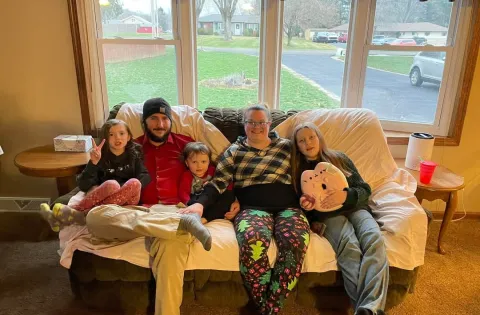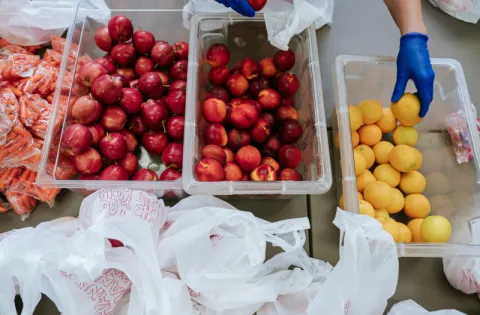When the school year ends and kids go on summer break, it is much more difficult to reach them with the meals they need. This places a tremendous strain on family budgets, already grappling with the economic fall-out of COVID-19. The challenge has fallen particularly hard on Latino families given the disproportionate impact of the pandemic on this community.
This blog post is also available in Spanish.
No Kid Hungry hosted a media town hall this week on summer hunger in Latino communities, conducted in Spanish with simultaneous English interpretation. Univision Anchor Carolina Sarassa led a discussion with school district leaders from across the country, who shared how they adapted their summer meal programs to face this crisis head on, and how they’ll continue to serve as a lifeline for kids and their families this summer.
Here are 5 key takeaways from the event:
The Latino community has been hit disproportionately hard by the COVID-19 pandemic, from a health standpoint and an economic one, increasing long-standing food insecurity disparities.
“Our school district is 86% Latino, and many come from low-income families. When we learned COVID was interrupting jobs, we knew that our Latino families would need our help,” said Eric Enciso, director of nutrition services for Colton Joint Unified School District in San Bernardino County, California. “This became clear when we went to a place where we were handing out food, and we saw a huge line of cars that covered the entire length of the street. Families would tell our staff, ‘Thank you so much, we lost hours at work or we lost our job and this is a great help.’ And it was clear that we would need to open more places like this.”
“It’s estimated that currently 39% of Hispanic families with children are at risk of hunger, in comparison to 15% of white families,” said No Kid Hungry’s Jeannine Rios. “That is why No Kid Hungry has drastically increased our grants to support meal programs and we work to promote awareness throughout the whole country and the different bilingual resources.”
There are unique barriers that keep Latino families from accessing free summer meals for their kids, from lack of awareness about the meals, to accessing information in their language, and fears stemming from prior anti-immigration policies.
“Many of our families face a lot of obstacles,” said Lucia Abernathy, district supervisor, Office of Food & Nutrition Services, New York City Department of Education. “Latino families are afraid to take advantage of our program, because they are afraid that we will ask them for ID or any personal questions, but that’s not the way it is. We ask no questions. We offer breakfast and lunch, totally free to all of the community in the city of New York, no questions asked.”
“It’s extremely important to reach our families across our district, so we have worked with our school community to make sure this information reaches the houses of our families,” Abernathy said. “This summer we have promotions on billboards, at bus stops, at grocery stores – in Spanish and English. On the last day of school, students will be taking flyers home in Spanish and in English so that parents are aware of the information they need on where these meals are going to be distributed and the hours when they will be distributed.”
The schools’ ability to quickly adapt to the situation at hand, understand the community’s needs, and utilize innovative measures, allowed them to better reach and serve the entire community.
In San Bernardino, that meant adding extra meals so that families could have enough for weekends when the services are not available. Colton JUSD also expanded their efforts to take meals to students who don’t have a home and live in motels.
“We thought, these kids don’t have a car to go get food. How do we get the food to them?,” said Enciso. “We spoke with the motel office and they gave us permission to go in. We had a table and started knocking on their doors. When the kids came it was very emotional. For us, it was simple food, but for them it was breakfast. You feel very proud, it is heartwarming.”
In the case of Abernathy's district in New York City, they expanded their service “This summer, for 2021, given the federal extension of flexibilities that we still have from the pandemic, we will be able to extend our summer meals program totally free, no costs at all, to any child and to adults as well. Not just 18 and under, but we are also going to be able to offer this to the adult community.”
It’s important to work with community partnerships to make summer meals accessible to all.
“Work with local partners like the parks department,” Enciso said of his team’s experience in San Bernardino County when asked for advice. “We found that our local parks were the perfect place to hand out a meal, where kids can also play for a bit. Speak with your city because they can help you to reach more people in the community.”
Awareness is key.
One of the most important ways organizations, schools and media can help meals reach the kids who need them is by getting information to parents about where to find free healthy meals for their children during the summertime. Even after the school year ends, school nutrition programs remain open and are available during the summer months.
“These programs are available throughout the whole country, through different schools and local organizations and independent of income or immigration status,” said Rios. “No Kid Hungry has launched a textline to help families find summer meals and different resources. People can text the word “COMIDA (or “FOOD”) to 304-304 to find the nearest places where they are distributing food, or visit NoKidHungry.org/Ayuda to find food in their area.”
“The best you can do to support the Latino community is spread the word” said Abernathy.
Panelists:
- Eric Enciso
Director of Nutrition Services
Colton Joint Unified School District
San Bernardino County, California - Lucia Abernathy
District Supervisor
Office of Food & Nutrition Services
New York City Department of Education - Jeannine Rios
Senior Program Manager
No Kid Hungry


